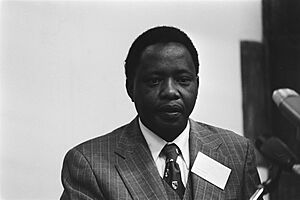Percy Qoboza facts for kids
Quick facts for kids
Percy Peter Tshidiso Qoboza
|
|
|---|---|

Percy Qoboza in 1978
|
|
| Born | 17 January 1938 Sophiatown, South Africa |
| Died | 17 January 1988 (aged 50) Johannesburg, South Africa |
| Pen name | Percy Qoboza |
| Occupation | Journalist, Newspaper Editor, Columnist |
| Nationality | South African |
Percy Peter Tshidiso Qoboza was an important South African journalist and writer. He was a strong voice against apartheid, which was a cruel system of racial separation in South Africa. During apartheid, the government treated black people unfairly.
Percy Qoboza wrote powerful articles that helped people around the world understand the terrible things happening in South Africa. His writings also helped many white South Africans see the problems caused by apartheid.
Contents
Early Life and Education
Percy Qoboza was born in 1938 in Sophiatown, a black township in South Africa. His family was from the Xhosa group. He saw firsthand how unfair life was under apartheid.
In 1952, his home, Sophiatown, was destroyed by the government. Many families were forced to leave their homes and move. This experience deeply affected him.
Later, Percy Qoboza studied theology at Lesotho University. He then returned to South Africa to study journalism.
Becoming a Powerful Editor
From 1974, Percy Qoboza became the editor of The World newspaper in Soweto. He used the newspaper to share important news and opinions.
When the Soweto riots happened on 16 June 1976, The World newspaper gave the world a unique view of the events. Under Qoboza's leadership, The World became very popular. It was a trusted source of news for black South Africans. However, the government saw it as a threat.
His special column, "Percy's Pitch," was eagerly awaited by readers. Because of his work, The World became the most widely read newspaper among black people in South Africa. This helped shape the views of many young black people who wanted immediate change.
Facing Challenges and Imprisonment
The government saw Percy Qoboza's strong voice as a danger. He and his family received many threats. On 19 October 1977, the government closed The World offices and banned the newspaper.
Percy Qoboza and many others were arrested and put in jail for six months without a trial. His family did not know if he was alive or safe. After his release, he was told to leave South Africa.
He was invited to the United States and worked with the Washington Star newspaper in 1980. Before this, in 1975, he had been a Nieman Fellow at Harvard University. This time in America helped him connect with journalists worldwide and further develop his ideas.
Return to South Africa and Legacy
Percy Qoboza returned to South Africa and became the editor of City Press in 1984. Again, his sharp writing style gave a strong voice to the fight against unfairness.
Sadly, he passed away in 1988 on his 50th birthday. He had a heart attack on Christmas Day in 1987 and fell into a coma. He did not live to see the end of apartheid, which was his life's work.
His funeral was attended by over 5,000 people. Many important leaders of the anti-apartheid movement were there, including Winnie Mandela. Journalists from all over the world also came to pay their respects.
In 2000, Percy Qoboza was named one of the International Press Institute's 50 World Press Freedom Heroes. This honor recognized his bravery and dedication to free press.
Percy Qoboza Award
The National Association of Black Journalists in the United States gives out an award each year in Percy Qoboza's honor. This award celebrates a foreign journalist who has done amazing work despite big challenges. It recognizes those who help people in the African diaspora (people of African origin living outside Africa).
Award Winners
- 2024 – Roberson Alphonse, Le Nouvelliste, Haiti
- 2023 – Marcus Ryder, Sir Lenny Henry Centre for Media Diversity
- 2022 – Nima Elbagir, CNN
- 2021 – Anas Aremeyaw Anas, Insight TWI
- 2020 – Mahmoud Hussein, Al Jazeera
- 2019 – Pap Saine, The Point
- 2018 – Chika Oduah, Voice of America
- 2017 – Wesley Gibbings
- 2011 – Jean-Claude Kavumbagu, Net Press
- 2008 – Imprisoned Journalists of Eritrea
- 2007 – National Union of Somali Journalists
- 2006 – Deyda Hydara, & Members of the Gambian Press Union (Posthumous)
- 2005 – Michele Montas, Haiti
- 2004 – Pius Njawe, Cameroon
- 2003 – Geoffrey Nyarota, The Daily News, Zimbabwe
- 2002 – Milkias Mihreteab Yohannes, Eritrea
- 2000 – Rafael Marques, Angola
- 1999 – Fred Mmembe, The Post, Zambia
- 1997 – Marie-Roger Biloa, Africa International magazine, Paris
- 1996 – Babacar Fall, Pan-African News Agency, Senegal
- 1995 – Kenneth Best, The Daily Observer, Liberia
- 1994 – Zubeida Jaffer, Cape Town, South Africa
- 1989 – Zwelake Sisulu, New Nation, South Africa
 | Bessie Coleman |
 | Spann Watson |
 | Jill E. Brown |
 | Sherman W. White |

